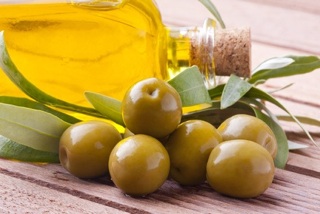by
Stepy —
September 20, 2018
- Olive oil has been recognized for many years as a healthy oil, full of important health benefits, healthy fats, and for good reason. It is often referred as: “Liquid Gold“.
- It is a favorite among Chefs, nutritionists and is also a staple in the heart healthy Mediterranean diet.
- Let’s take a look at the health benefits of olive oil.
- Anti-inflammatory:
- Olive oil has a wide variety of polyphenols, which are substances found in olive oil (and many other foods) that help reverse pro-inflammatory enzymes and molecules in the body.
- Just 1-2 tablespoons of olive oil a day can help with inflammation.
- Bone health:
- There has been a lot of research on olive oil in relation to bone health. A study in Berlin showed that olive oil helps increase blood levels of calcium, which is a mineral often linked to stronger bones.
- Further research is needed to confirm these benefits.
- Brain health:
- Better health of the brain and cognitive function is often linked to the Mediterranean diet. Since olive oil is one of the main ingredients in this diet, research has been done on olive oil in relation to brain health.
- A study from France showed that intensive use of olive oil helped with visual memory. Further studies are needed to confirm this relationship, but the results are promising.
- Cancer prevention:
- The polyphenols in olive oil help lower the risk of certain types of cancers, which is why it is part of the top 10 cancer fighting foods. Most cancers are caused by oxidative stress and chronic inflammation.
- According to Dr. Andrew Weil, “Oxidative stress is the total burden placed on organisms by the constant production of free radicals in the normal course of metabolism plus whatever other pressures the environment brings to bear (natural and artificial radiation, toxins in air, food and water; and miscellaneous sources of oxidizing activity, such as tobacco smoke).” Polyphenols act as antioxidants by fighting the effects of oxidative stress, which are often linked to cancer. They also reduce chronic inflammation, which is also linked to certain types of cancers.
- The stronger the flavor of the oil, the higher the level of its polyphenols.
- It also contains high levels of oleic acid, a potent anti-cancer fatty acid.
- Digestive health:
- So many of the benefits of olive oil are due to polyphenols. Digestive health is another one. Polyphenols slow down the growth of unwanted bacteria that is linked to digestive tract infections. They also stop the growth of H. Pylori, a bacterium that is often linked to stomach ulcers.
- Recent research is showing that olive oil may also help reduce the risk of digestive tract cancers.
- Suggestions:
- “It’s important to realize it is NOT good for cooking. It should really only be used cold, typically drizzled on salads and other food. Due to its chemical structure and a large amount of unsaturated fats, cooking makes extra-virgin olive oil very susceptible to oxidative damage,” states Dr. Joseph Mercola.
- Please note that Olive oil fraud is also common, so make sure you are getting it from a reputable source.
- How to store:
- Keep in a cool, dark place.
- Purchase smaller bottles rather than larger to ensure freshness.
- Unusual uses of olive oil:
- Olive oil is also known for its many versatile uses: Skin moisturizer, eye make up remover, earache remedy, cuticle oil, hair growth, sunburn relief, furniture polish, natural lubricant for a close shave to name a few.
- For tips to avoid olive oil fraud.
- For olive oil as an earache remedy.
- For olive oil and hair loss.
- For the top 10 cancer fighting foods.
- REFERENCES
- 1. “Olive Oil, Extra Virgin.” WHFoods.org. The World’s Healthiest Foods, n.d. Web. 08 July 2013.
- 2. Mercola, Joseph, DO, and Rudi Moerck, PhD. “New Warning About Olive Oil.” Mercola.com. Dr. Joseph Mercola, 20 Oct. 2010. Web. 8 July 2013.
- 3. Staff, Mayo Clinic. “Mediterranean Diet: A Heart-healthy Eating Plan.” Mayo Clinic. Mayo Foundation for Medical Education and Research, 14 June 2013. Web. 08 July 2013.
- 4. Psaltopoulou, Theodora, Rena I. Kosti, Dimitrios Haidopoulos, Meletios Dimopoulos, and Demosthenes B. Panagiotakos. “Olive Oil Intake Is Inversely Related to Cancer Prevalence.” National Center for Biotechnology Information. U.S. National Library of Medicine, 30 July 2011. Web. 08 July 2013.
- 5. Staff, Mayo Clinic. “H. Pylori Infection.” Mayo Clinic. Mayo Foundation for Medical Education and Research, 24 May 2011. Web. 08 July 2013.
- 6. “Olive Oil and Cognition: Results from the Three-city Study.” National Center for Biotechnology Information. U.S. National Library of Medicine, n.d. Web. 08 July 2013.
- 7. Weil, Andrew, M.D. “Stumped by Oxidative Stress?” Stumped by Oxidative Stress? Dr. Andrew Weil, n.d. Web. 08 July 2013.
- 8. Hensrud, Donald, MD. “If Olive Oil Is High in Fat, Why Is It Considered Healthy?” Mayo Clinic. Mayo Foundation for Medical Education and Research, 26 Mar. 2011. Web. 08 July 2013.


















